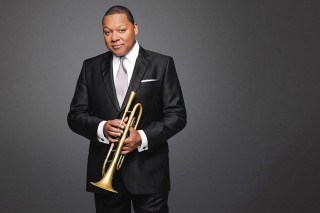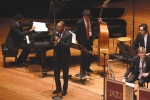Title

A signal event in the Juilliard concert schedule is coming up shortly: on April 6, the Juilliard Jazz Orchestraplays the music of Wynton Marsalis ('81, trumpet) at Alice Tully Hall, conducted by the composer himself.
Body
The shortest distance between two points is a straight line, and following that dictum, the Juilliard Jazz Orchestra is a direct legatee of the greatest jazz orchestra in American history—Duke Ellington's.
How did this occur? We had to look no further than Marsalis himself, the director of Juilliard Jazz, who decades ago heeded the advice of one of his mentors, jazz giant Dizzy Gillespie. As Marsalis assumed the leadership of Jazz at Lincoln Center, the young trumpeter struggled with the challenge of maintaining his famous septet along with creating a big band. Gillespie's reply was as spartan as it was definitive: “One should not consider it an achievement to lose one's orchestral tradition,” Marsalis recalled in a recent conversation with The Journal.
“When we started the band it was with a lot of the surviving members of the Ellington band, including clarinetist Jimmy Hamilton, trumpeters Clark Terry and Willie Cook, and trombonist Britt Woodman,” Marsalis said. “Baritone saxophonist [and late Juilliard faculty member] Joe Temperley was the holdover and became the root of the new band I began to form—keeping that Ellingtonian spirit alive and thriving. Many of the players in my septet then were from New Orleans and we had a family type of vibe. Growing up into jazz with my father [Ellis Marsalis], I always liked the feeling of the music and the musicians and how we treat each other,” he added. “The type of soul and the love and the vibration we had is really what the music is, and we maintain that tradition.”
The transition to the band as it today, Marsalis explained, “began when everybody began to write music for the band and, importantly, teach. We were so happy when younger musicians that we had taught began to come into the band, like Walter Blanding, Carlos Henriquez, and Chris Crenshaw.”
A hallmark of Marsalis's evolution as a composer has been his willingness to write music for ensembles ranging from the smallest to the largest. When asked which comes first, the compositional germ or the assignment, he replied, “When I know what the instrumentation is, then I start to shape the ideas for that instrumentation. But at that point the ideas are not even music yet, they're just ideas. Once I get the form in order, then I go back into where the ideas are and tailor them for the ensemble,” he said. “Every time I write something, I try and learn something different—new ways of doing things, new harmonic progressions, voicings—all in order to become more adept.”
From the abstract world of compositional imperatives, Marsalis quickly modulated into the practical goals he has in place for the Juilliard Jazz program in general, and specifically for the Juilliard Jazz Orchestra. “We want them to learn the Ellingtonian principles, to work together, how to lead and how to follow, how to play with a great dynamic range, how to develop an overview that includes other people, how to make the transition from big band to a small band and back,” he said. “First and foremost, at the same time, to develop a comprehensive understanding of our music.”
Marsalis chose the program for the April 6 concert “to present a challenge to the players, each one has a different kind of difficulty, another sense of timbral color, of what a big band can accomplish,” he said. It covers a wide range of Marsalis masterpieces, with selections from his albums Jump Start, Congo Square, Vitoria Suite, the Pulitzer-winning Blood on the Fields, and Big Train. The program is fully in keeping with the ultimate goal Marsalis has in mind for the Juilliard Jazz students. “We want to train the finest musicians that we can train and give them the tools to develop into leaders, people who can come in to communities and have a positive effect with the music.”
You'll hear all that turned into rhythm, melody, and harmony—plus a lot of swing—on April 6.





